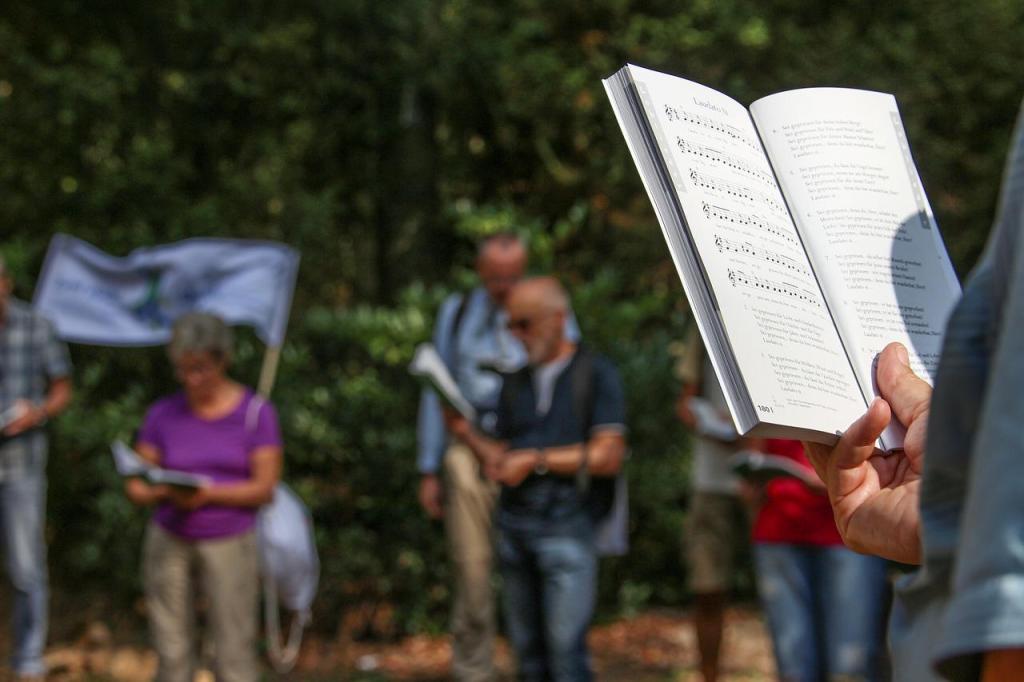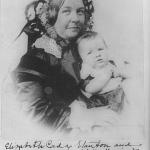In our society and in our churches, we continue to build walls marking “out” and “in”. We continue to mark boundaries of “us” and “them”, of “normal” and “other”. Songs for the Holy Other aims to provide congregations working to dismantle these walls with a toolbox of hymns by and for those who identify as members of the lesbian, gay, bisexual, pansexual, transgender, nonbinary, queer, questioning, intersex, asexual, aromantic, two-spirit, and other sexual/gender minority (LGBTQIA2S+) community and their allies. For many members of the LGBTQIA2S+ community, assimilation is not an option; we continue to be othered for our identities, relationship-styles, dis/abilities, race, economic status, and more. The title, Songs for the Holy Other, is a self-conscious claiming of otherness as holy and beloved of God. We who have been labeled as “wholly other” are claiming our holiness, and reclaiming our otherness as a prophetic witness to the church.
Here are the titles and authors of the hymns that comprise the collection,
A Hymn for Self-Acceptance – Wesley King
Alchemy of Healing – Gilo
All Belong Here – Lenora Rand
All Colors of the Rainbow – Carl P. Daw
As Colors in the Sky – Dan Damon
Blest Be the Holy Other – Dan Windham
Christ Our Health – Edward Moran
Fearfully, Wonderfully Made – Nathan Crabtree and Erik Whitehill
For all the Children – David Lohman
For Those Who Suffered – Benjamin Smith
God Calls You Good – Paul Vasile
God Gave This World – Carmen Llanos
God Loves Us in Mysterious Ways – Edward Moran
God of Many Faces – Amy Cerniglia
God of Queer Transgressive Spaces – Edward Moran
God’s Limitless Imagination – David Lohman
God’s Love is Boundless – Adam M. L. Tice
I Know That God Loves Me – Sherry Klinedinst
I Met a Stranger on the Road – David Bjorlin
I Shall Not Leave from by Your Side – Chris Shelton
Impartial, Compassionate God – Adrienne Stricker
Jesus, You Have Truly Called Us – Dan Damon
Like the Weeping Willow – Amy Sens
Love Astounding – Jeannette Lindholm
Love’s Rage and Grief – Jeannette Lindholm
Lovely, Needy People – Lenora Rand
New patterns for Living – Barbara Hamm
O God, Bestow Your Love and Care – Barbara Hamm
Pour Your Freedom Over Me – Cheryl Bragg
Queerly Beloved – Amanda Udis-Kessler
Quirky, Queer and Wonderful – Adam M. L. Tice
Rest in Power – Elaine Romaneli
Rise Up – Kim Jamae Williams
Sing a New World into Being – Mary Louise Bringle
The Dove Will Fly on Mended Wing – Tim Reaburn
The Heart Will Choose the One It Loves – Barbara Hamm
The Kingdom of God is the Queerest of Nations – Amanda Udis-Kessler
The Love That Goes Unspoken – Mary Louise Bringle
Transfigure Me – Christopher Grundy
We Are a Rainbow – David Kai
We Are The Hidden – Slats Toole
We’ll Build a World – David Lohman
Weary Seekers – Gretchen Toler Debus
When Comes the Time – John Schimminger
Who Is the Alien – Mary Louise Bringle
With Open Hearts – Mary-Ellen Kish
I find these titles very poignant. The LGBTQIA2S+ folks crave acceptance. Even though they have attained a remarkable level of social acceptance–to the point that it’s their critics who are no longer socially acceptable–they still don’t feel accepted and evidently have problems with “self-acceptance.” They therefore crave God’s love. And He does love them.
What seems to be missing from this list are what the old gospel music singers called “blood songs.” That is, songs about being cleansed by the blood of Jesus. “What can wash away my sins?/Nothing but the blood of Jesus.” “Just as I am, without one plea/
But that Thy blood was shed for me.” And from the great but anguished poet William Cowper,
There is a fountain filled with blood
Drawn from Immanuel’s veins;
And sinners, plunged beneath that flood,
Lose all their guilty stains.
And many more, in this vein (sorry!), both old and new.
But the hymns of cleansing by the blood imply that the person is unclean. And this seems to be what the LGBTQ theology does not want to accept. The message to gays and transexuals is that there is nothing wrong with them or what they do or what they desire, that they are already clean. And yet, these songs suggest that they feel otherwise, and that they are struggling not to feel what they do feel, that primal guilt that all human beings feel, if they are honest.
Surely the churches that download these songs speak of some sins–greed? selfishness? unkindness?–if not sexual sins, as if sex did not bring out the worst in us. Surely they avoid the temptation to just rail against the sins of others–the injustice of oppressors, the evil of conservatives–which would be the mirror image of what can be found in self-righteous fundamentalist congregations.
We all need to be convicted of sin–our sin and our sins, in their enormity–whereupon we can find cleansing in the blood of Jesus. That can be manifested very powerfully in sacramental churches that actually give the sinner the blood of Jesus in Holy Communion. That cleansing may not eradicate our sinful tendencies, sexual or otherwise, but the cleansing is something that we must continually receive, Sunday after Sunday, day by day, though our growing faith will bear fruit in growing holiness.
The hymnal is called “Songs for the Holy Other.” This draws on postmodernist terminology to the effect that oppressors dehumanize those they marginalize and mistreat by considering them “other.” Yes, respectable folks have often through history considered gays to be “other.” But the congregations that sing these hymns evidently do not. And members of the “LGBTQIA2S+) community” don’t consider each other to be “other.” And yet they sing about being “other.” Technically, their “other” would be the conservatives who don’t approve of their “identities.” Are they working to accept those others as holy too?
I think the way forward in ministering to individuals in the “LGBTQIA2S+) community” is not to see them as “other,” but to see them as fellow sinners like everyone else. Conversely, that is also how they should be encouraged to see themselves. And none of us should minimize the desperate state of our sinfulness.
The title of the hymnal also alludes in a wordplay to an important theological principle. God is “wholly other.” He is utterly different from us. We cannot comprehend Him. We cannot expect Him to conform to our desires or demands or understanding. We are completely dependent on what He reveals about Himself in His Word.
He–not gays, or not any human beings–is the “Holy Other.” We dare not construct a deity according to our own preferences. That would be an idol. Nor dare we presume to improve upon His moral law, as much as we might want to. But His self-revelation in His Word affirms the absolute truth that He does love us. And sent His son, God incarnate, to die for our sins. Whereupon, believing this, we sinners are justified, declared righteous even though we are not righteous. Made one with Christ by Word and Sacrament, we are saved; that is, we find acceptance by God Himself.
HT: Jim Denison
Image by DoroT Schenk from Pixabay














